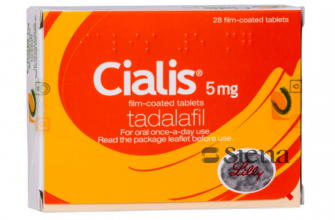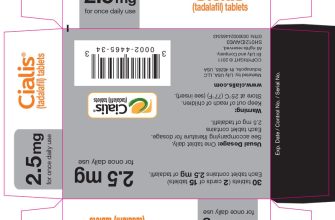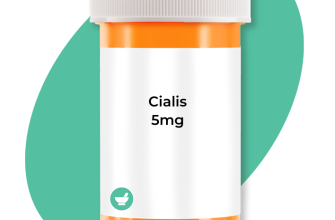Consult your healthcare provider before using Viagra, particularly if you have concerns about blood pressure. This medication can lower blood pressure in some individuals, especially when taken alongside certain medications, such as nitrates. Understanding these interactions is key to ensuring your safety and well-being.
Viagra works by increasing blood flow to the penis, which may potentially lower systemic blood pressure. Clinical studies indicate that the average decrease can range from 5 to 10 mmHg. While this may benefit men with certain health conditions, it may pose risks for those with pre-existing low blood pressure or on antihypertensive medications.
If you experience symptoms like dizziness or fainting after taking Viagra, it’s important to seek medical advice. Adjustments to your medication regimen or further evaluation may be necessary. Staying informed and communicating openly with your doctor will help ensure that you achieve the desired results safely.
- Viagra and Blood Pressure: A Comprehensive Guide
- Understanding How Viagra Affects Blood Pressure
- Clinical Studies on Viagra’s Impact on Blood Pressure Levels
- Effects in Specific Patient Populations
- Guidelines for Use
- Potential Benefits of Viagra for Hypertension Patients
- Improved Blood Flow
- Pulmonary Hypertension Management
- Risks and Side Effects: Viagra and Low Blood Pressure
- Interactions: Viagra with Antihypertensive Medications
- Consulting Your Doctor: When to Use Viagra with Blood Pressure Concerns
- Patient Experiences: Testimonials on Viagra and Blood Pressure Management
- Success Stories
- Tips for Safe Use
Viagra and Blood Pressure: A Comprehensive Guide
Viagra can lower blood pressure temporarily. Beginning its action, Viagra inhibits the enzyme phosphodiesterase type 5 (PDE5), leading to relaxation of blood vessels. This mechanism often results in a modest decrease in blood pressure, which is generally well-tolerated in healthy individuals.
Patients using nitrates for heart conditions must avoid combining them with Viagra due to the risk of a significant drop in blood pressure. Always consult a healthcare provider before starting Viagra, particularly if you have a history of heart disease or are taking other medications that may influence blood pressure.
Monitor your blood pressure regularly when using Viagra. It’s advisable to measure it before and after use, especially during the initial dosage period. Document any significant changes or symptoms and share this information with your healthcare provider.
Individuals with high blood pressure should inform their doctor, who can recommend the safest approach tailored to their health profile. Lifestyle adjustments, such as a balanced diet, regular exercise, and stress management, play integral roles in managing blood pressure effectively.
Be aware of potential side effects. Common issues include headaches or flushing, which can arise from blood vessel dilation. Most side effects diminish over time. However, if they persist or worsen, seeking medical advice is necessary.
In conclusion, while Viagra may have implications for blood pressure, responsible usage under medical supervision can lead to positive outcomes without significant risk. Always prioritize open communication with healthcare professionals to ensure safe and effective treatment.
Understanding How Viagra Affects Blood Pressure
Viagra, or sildenafil, can have a noticeable impact on blood pressure. It primarily acts as a vasodilator, leading to the widening of blood vessels, which can lower blood pressure temporarily.
Here are key points regarding its effect on blood pressure:
- Viagra lowers blood pressure due to its mechanism of action, enhancing blood flow by relaxing the smooth muscles of blood vessels.
- It can cause a mild drop in blood pressure, typically around 5-10 mmHg.
- This effect is usually transient, with blood pressure returning to baseline after several hours.
- Those with pre-existing low blood pressure or heart conditions should consult a healthcare provider before using Viagra.
For individuals taking medications that also lower blood pressure, combining these with Viagra may lead to hypotension.
Monitoring is essential for anyone considering Viagra, especially if they have underlying cardiovascular issues. Consult with a healthcare professional for tailored advice based on personal health conditions.
In conclusion, while Viagra has a measurable effect on blood pressure, understanding individual health status and potential interactions with other medications is crucial for safe use.
Clinical Studies on Viagra’s Impact on Blood Pressure Levels
Research shows that Viagra, also known as sildenafil, generally has a mild effect on blood pressure. Clinical trials reveal that it can cause a slight decrease in systemic blood pressure, particularly in individuals taking antihypertensive medications. In studies with healthy volunteers, sildenafil reduced blood pressure by about 5-10 mmHg post-dose, a result most noticeable two hours after administration.
Effects in Specific Patient Populations
Clinical studies involving patients with pulmonary hypertension indicate significant pulmonary vasodilation without causing critical systemic hypotension. In these studies, patients using sildenafil experienced an improvement in exercise capacity coupled with manageable blood pressure levels. Observations indicate that men with erectile dysfunction (ED) and hypertension tolerated sildenafil well, with no severe drops in blood pressure, highlighting its safety profile in this demographic.
Guidelines for Use
Healthcare providers often recommend monitoring blood pressure before and after initiating treatment with Viagra, especially for patients on other antihypertensive therapies. It’s vital for patients to disclose all medications they are taking to prevent potential adverse interactions. For patient safety, moderate doses are suggested, particularly for those with pre-existing cardiovascular conditions.
Potential Benefits of Viagra for Hypertension Patients
Viagra, primarily known for treating erectile dysfunction, shows promise for patients with hypertension. Research indicates that sildenafil, the active ingredient, can aid in lowering blood pressure. This effect can enhance blood flow and potentially reduce hypertension-related complications.
Improved Blood Flow
Sildenafil promotes vasodilation, relaxing blood vessels and improving circulation. This mechanism can lead to a reduction in systolic and diastolic blood pressure levels. By widening blood vessels, Viagra may help maintain healthier blood pressure readings for hypertensive individuals.
Pulmonary Hypertension Management
For patients suffering from pulmonary hypertension, Viagra can provide significant relief. Studies reveal that it effectively lowers pulmonary artery pressure, improving exercise capacity and quality of life. Monitoring by healthcare professionals is critical to ensure optimal dosing and safety.
Always consult a healthcare provider before starting sildenafil, particularly for those already on antihypertensive medication. Personalized advice ensures safe integration of Viagra into a treatment plan, maximizing its potential benefits for hypertension management.
Risks and Side Effects: Viagra and Low Blood Pressure
Viagra can significantly lower blood pressure, which may lead to potential risks for individuals with existing low blood pressure conditions. If you experience symptoms like dizziness, fainting, or lightheadedness after taking Viagra, contact your healthcare provider promptly.
Monitoring is crucial, especially if you’re on medications for hypertension or other cardiovascular issues. Combining Viagra with nitrates or blood pressure medications can amplify hypotensive effects. This combination can cause severe drops in blood pressure, leading to serious health issues.
Common side effects include headaches, flushing, and nasal congestion, but these typically resolve shortly after use. Pay attention to how your body reacts to Viagra, particularly if you have a history of cardiovascular problems or low blood pressure.
Consult your doctor before starting Viagra to develop a personalized plan that effectively manages both erectile dysfunction and blood pressure concerns. Regular follow-ups can help ensure your safety while using this medication.
Stay informed about potential interactions and side effects. Knowledge empowers you to make safe choices regarding your health and medication use.
Interactions: Viagra with Antihypertensive Medications
Consult a healthcare provider before using Viagra with antihypertensive medications. Combining these can lead to significant drops in blood pressure, causing dizziness or fainting. Certain antihypertensive classes, like nitrates or alpha-blockers, heighten this risk. For instance, nitrates used for chest pain should never be taken alongside Viagra, as this combination can dangerously lower blood pressure.
Monitor your blood pressure closely if you are on both Viagra and any form of alpha-blocker. These medications may also enhance Viagra’s effects, but they can result in hypotension. Some individuals might experience sudden drops that require medical attention.
Always inform your doctor of all medications being taken to tailor treatment effectively. Your healthcare provider can adjust dosages or suggest alternative therapies that minimize risks. Regular follow-ups are important to ensure safety and efficacy when using these medications together.
Exercise caution and be proactive about discussing any symptoms with your physician, as early intervention can prevent complications. Take an informed approach to manage your health effectively.
Consulting Your Doctor: When to Use Viagra with Blood Pressure Concerns
Before considering Viagra, consult your doctor, especially if you have blood pressure issues. Your healthcare provider will assess your health status, review your current medications, and determine if Viagra is safe for you. It’s critical to share your full medical history, including any heart conditions and blood pressure medications you take.
| Blood Pressure Category | Viagra Considerations |
|---|---|
| Normal (less than 120/80 mmHg) | Generally safe; monitor for any side effects. |
| Elevated (120-129/<80 mmHg) | May be used, but regular monitoring required. |
| Hypertension Stage 1 (130-139/80-89 mmHg) | Consult your doctor for careful evaluation. |
| Hypertension Stage 2 (140 or higher/90 or higher mmHg) | A thorough assessment is needed. Alternatives might be advised. |
Your doctor may suggest lifestyle changes or adjustments to your medication regimen before prescribing Viagra. Regular follow-up appointments help evaluate your response and any side effects experienced. Monitor your blood pressure regularly, especially after starting Viagra.
Keep communication open with your healthcare provider. If experiencing symptoms such as dizziness or headaches after taking Viagra, inform your doctor promptly. They can adjust your treatment plan to ensure safety and efficacy.
Patient Experiences: Testimonials on Viagra and Blood Pressure Management
Many patients share positive experiences regarding the use of Viagra while managing blood pressure. Below are insights and recommendations directly from those who have navigated this situation.
Success Stories
- John, 54: “I started using Viagra after discussing my erectile dysfunction with my doctor. My blood pressure was stable, and I noticed an improvement in my confidence. It didn’t affect my blood pressure negatively at all.”
- Maria, 47: “I was hesitant to try Viagra because of my hypertension. However, my doctor reassured me that, when used properly, it could enhance my quality of life without raising my blood pressure.”
- David, 62: “Viagra worked well for me. My doctor monitored my blood pressure during the first few uses to ensure everything was fine. It was great to finally feel normal again.”
Tips for Safe Use
- Consult your doctor before starting Viagra. Ensure they understand your complete health profile.
- Monitor your blood pressure regularly, especially after beginning treatment.
- Start with a lower dosage to see how your body reacts before adjusting.
- Be aware of potential interactions with other medications you may be taking for blood pressure control.
Listening to patient experiences can guide new users. For those with blood pressure concerns, these real stories provide reassurance and valuable information. Always prioritize open communication with your healthcare provider to ensure the safest and most effective approach.










